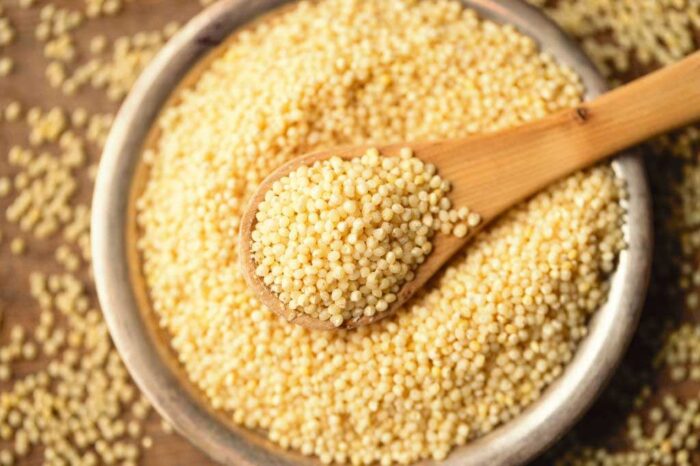Established in 1992 at Paramakudi in southern Tamil Nadu, South Indian Grains Corporation has a rich experience of more than 27 years in processing millets; Barnyard Millet, Kodo Millet, Little Millet, Foxtail Millet, and Proso Millet. The company procures about 2000 – 3000 tons of millet grains annually as raw materials for processing. The raw millet grains are purchased from thousands of farmers from Ramanathapuram, Madurai, and other districts of Tamil Nadu and neighboring states who grow millets as rain-fed crops under no or low external input agriculture.
LITTLE MILLETS
Little Millet is known for its nutritional richness in Carbohydrates, Dietary fiber, Protein, Calcium, Phosphorous, Iron, Thiamin, and Niacin. They satisfy a wide range of consumers’ preferences by bringing forth three different categories of processed Little Millet grains viz., Semi-Polished, Parboiled, and dehusked.
FOXTAIL MILLETS
Being one of the widely grown small millet, Foxtail Millet is a rich source of Carbohydrates, Protein, Calcium, Phosphorus, Magnesium, Iron, Thiamin, and Folic acid. They satisfy a wide range of consumers’ preferences by bringing forth three different categories of processed Foxtail Millet grains viz., Semi-Polished, Parboiled, and Dehusked.
KODO MILLETS
Kodo Millet has a substantial amount of dietary fiber apart from being a rich source of minerals viz., Calcium, Magnesium, Iron, Riboflavin, Thiamin, and Folic acid. They meet a wide range of consumers’ choices by bringing forth three different categories of processed Kodo Millet grains viz., Semi-Polished, Parboiled, and Dehusked.
BARNYARD MILLETS
Known for its Dietary fiber content, Barnyard Millet is a rich source of Mineral elements viz., Phosphorus, Calcium, Magnesium, Zinc, and Niacin. They satisfy a wide range of consumers’ preferences by processing three different categories of processed Barnyard Millet grains viz., Semi-Polished, Parboiled, and Dehusked.
PEARL MILLETS
Pearl millet helps to reduce cholesterol and magnesium helps to lower blood pressure and reduces the risk of heart attacks. The high fiber content helps in keeping the glucose level normal. It helps in weight loss and also helps to cure stomach ulcers and gallbladder stones.
PROSO MILLETS
Proso millet can be used for human consumption, livestock feed, and birdseed – a common use in the United States. Millet is desirable for human food because it is easily digestible and gluten-free. It can be ground into flour, used to bake flatbreads, used to make tabbouleh, or for brewing beer.
RAGI MILLET
Ragi is also a rich source of fiber and helps lower cholesterol levels. Ragi is the best food for weight control, diabetes, and cooling the body. Some ragi recipes you can try include — dosa, vermicelli, kanji, malt, ragi balls, roti, etc
MILLET FLOUR
Millet flour is a gluten-free grain that is alkaline, which makes it easy to digest and helps balance the body’s natural tendency towards acidity. Their Millet flour has a light, mild flavor, making it perfect for sweet or savory baking. It lends a delicate cake-like crumb to your baked goods.
DE-HUSKED MILLET GRAINS
De-husking (removal of the indigestible seed coat of husked millets) is done mechanically to make them fit for human consumption. Higher retention of nutrients and fiber in this type of processing enables multiple options for value addition.
- De-husked Barnyard Millet (Kuthiraivali in Tamil)
- De-husked Kodo Millet (Varagu in Tamil)
- De-husked Little Millet (Samai in Tamil)
- De-husked Foxtail Millet (Thinai in Tamil)
- De-husked Proso Millet (Panivaragu in Tamil)
SEMI POLISHED MILLET GRAINS
Semi polishing of millet grains is done after the dehusking process to retain about 60 – 70% of the original by removing excess fiber thereby increasing carbohydrate content to suit specific consumer needs like white color, easier cooking, edibility, and digestion.
- Semi-Polished Barnyard Millet (Kuthiraivali in Tamil)
- Semi-Polished Kodo Millet (Varagu in Tamil))
- Semi-Polished Little Millet (Samai in Tamil)
- Semi-Polished Foxtail Millet (Thinai in Tamil)
- De-husked Proso Millet (Panivaragu in Tamil)
PARBOILED MILLET GRAINS
The age-old practice of parboiling is done to achieve more shelling efficiency in millet grains with less breakage, translucent kernels, and increased swelling when cooked to get the desired softness. Parboiled millet grains are also found to be more suitable than raw millet grains for making Indian traditional breakfast items like idly and dosa.
- Parboiled Barnyard Millet (Kuthiraivali in Tamil)
- Parboiled Kodo Millet (Varagu in Tamil)
- Parboiled Little Millet (Samai in Tamil)
- Parboiled Foxtail Millet (Thinai in Tamil)
Infrastructure
They have segregated their infrastructure into units for fast processing and packaging. Availing guidance from Tamil Nadu Agricultural University, an R&D institute of international repute and research collaboration with Department of Home Science and Research Centre, TBAK College for women, Kilakarai, processing of millet grains are carried out scientifically preserving their nutritional advantage. Advanced technology and imported machinery (German) are employed during pre-cleaning, dehulling, polishing, sorting, storing, and packing of the different categories of processed millet grains.
South Indian Grains Corporation,
3/85, Thiru Nagar, Thelichathanallur,
Paramakudi-623 707, Ramnad District,
Tamilnadu, INDIA
+91 7539942033 (Mr.R.Ashokkumar)
+91 9842424521 (Mr.E.Ramesh)
+91 9842425304 (office)
You may also be interested in this millet noodles exporter:
